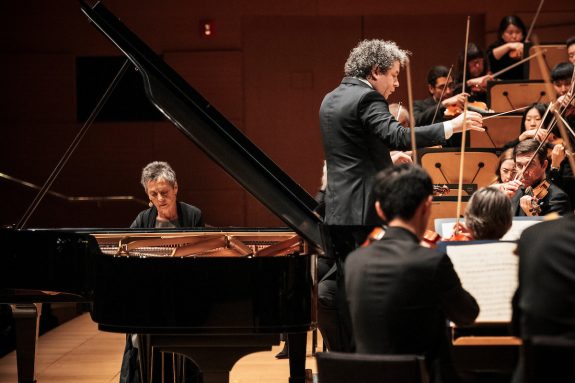 United States Correia, Beethoven, R. Strauss: Maria João Pires (piano), Robert deMaine (cello), Teng Li (viola), Los Angeles Philharmonic / Gustavo Dudamel (conductor). Walt Disney Concert Hall, Los Angeles, 2.5.2024. (LV)
United States Correia, Beethoven, R. Strauss: Maria João Pires (piano), Robert deMaine (cello), Teng Li (viola), Los Angeles Philharmonic / Gustavo Dudamel (conductor). Walt Disney Concert Hall, Los Angeles, 2.5.2024. (LV)

Andreia Pinto Correia – Cortejo
Beethoven – Piano Concerto No.4 in G major, Op.58
R. Strauss – Don Quixote
Returning to the podium after more than three months, on the same day that the Los Angeles Philharmonic announced Kim Notelmy from the Dallas Symphony would be its new CEO, Gustavo Dudamel was greeted with warm applause from the audience before he launched into the world premiere of Cortejo, Andreia Pinto Correia’s marvelous, often very loud, always very emotional reflection on Cervantes’s ‘hidalgo’ (aka Don Quixote).
The young Portuguese composer writes in her program notes that she ‘strove to conjure elements of Iberian processions – ritual and communal, religious and pagan, celebratory and mournful – witnessed throughout my life’. The six ‘episodes’, played without pause as if they were panels in an abstract musical diorama, tell a very different story from Richard Strauss’s precise narrative about the same hero with which the evening would conclude. The happy and tragic sides of ceremonial chords and harmonies bubbled occasionally with primeval energy, set off by little touches like a single short note from the English horn. A flash of seismic activity erupted into a world of beautifully off-key sirens and lots of strings before the last procession went quietly away.

After the cautious poetry of Maria João Pires’s opening few bars, Dudamel set a pace for the tutti of Beethoven’s Piano Concerto No.4 that was alive with the springtime freshness of youth. He phrased the return to the pianist’s first big entrance gracefully and graciously: this was one of those performances where you wait for the artist at the keyboard to reveal treasures and insights on a structure laid out for her by the artist on the podium. The leisurely pace at which they took the music had tremendous benefits of its own, reveling in the slow, minor-key triplets as essentially Beethoven. Dudamel and the LA Phil stayed with her at every bar, adjusting as necessary to suit her elegant sense of pace which allowed her to lavish care and love on the 16th-note passages.
The slow movement’s dialogue seemed to take place in darkness, as if the pianist’s introspective self was unaware of the blocks of orchestral sound passing by. A battery of outstanding trumpets and drums set a lively clip for the Rondo at which Pires never faltered, and her last statement of the recurring theme, before rushing to the end, was softer than the others, sad and touching.
With LA Phil principals Robert deMaine and Teng Li on platforms (although both played with the orchestra for much of the way), Dudamel led a performance of Richard Strauss’s Don Quixote that consisted of vivid episodes lightly held together by a sense of aspirational sweep, more like Terry Gilliam’s Adventures of Baron Munchausen than a sprawling Romantic tone poem. The magnificent soloists were more like instrumental heroes than characters from a novel, deMaine’s Don heroically bold and incisive, and Teng Li’s Sancho Panza even bolder with an impressively rustic attitude. Concertmaster Martin Chalifour’s Dulcinea was the most sweetly brilliant of them all – although he had no platform. A pity that after all the thrilling Technicolor adventures, Dudamel allowed the musical forces to drift quietly to an uneventful end.
Laurence Vittes
